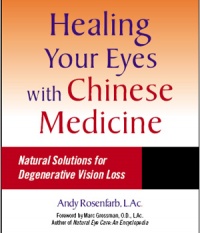| Close Window |
http://www.acufinder.com/Acupuncture+Information/Detail/Understanding+Vision+Problems+through+Traditional+Chinese+Medicine
04/19/2024 04:20:21 pm
Understanding Vision Problems through Traditional Chinese Medicine
By: Andy Rosenfarb, MTOM, Dipl. Ac., Dipl. C.H.

|

|
|
|
Simply stated, if a person has good resistance, the body can ward off potential hazards associated with these external stress factors. The person with strong Vital Qi will also recover easily from trauma. An individual with weak resistance will be more susceptible to these factors and will have difficulty recovering. The occurrence of and ability to recover from chronic eye conditions reflect the struggle between the Vital Qi (immune response) and the six environmental and seven emotional pathogenic factors.
Environmental Causes of Degenerative Vision Loss
The Six Environmental Pathogenic Factors
- Fire/heat - Swelling, inflammation,redness (common in acute eye disease)
- Cold - Slow onset, sharp pain (most cases of chronic degenerative vision loss)
- Wind - Sudden and rapid onset (common in acute eye disease)
- Dampness - Mucus, edema,secretions, slow onset
- Dryness - Dryness, itching, redness
- Summer Heat - Inflammation with mucus
Any of these factors can invade the body through the skin, mouth, nose, or the meridians. They may invade the upper part of the body and affect the vision or directly traumatize the eyes. One or more pathogens can damage the eyes, causing vision loss. These influences are closely related to the seasons and commonly arise during seasonal changes.
Of these six external factors, wind and fire usually attack the eyes in acute cases. These are considered “Yang conditions of the eye.” Wind is the leading pathogenic factor, which can easily bring other environmental “evils” into the eyes. Wind is characterized by rapid change and sudden onset. Fire is characterized by inflammation, ulceration, and redness. Other pathogenic factors can easily be turned into fire toxin.
Dryness and summer heat are other Yang pathologies. Dryness is where the Blood and fluids are diminished and fail to nourish the eyes. This is often the effect of wind, cold, and/or fire. Summer heat is caused by extreme environmental heat and fluid exhaustion. It is often accompanied by dampness (mucus and yellow discharge).
“Dampness” and “coldness” are generally considered “Yin” conditions. Lack of healthy Yang-Qi or metabolic heat allows for susceptibility to these kinds of patterns. Most vision loss conditions are the result of cold, which results in poor circulation to the eyes. The invasion of cold bottles up and/or consumes the Yang-Qi, depriving the eyes of warmth and nourishment. Relative coldness may also settle into the muscles, vessels, and skin around the eyes.
Note: Moxibustion (herbal heat therapy) remains one of the best means of dispersing cold-stagnation in the eyes. Local moxa application near the eyes should only be performed by an experienced practitioner
Other Factors That Can Cause Damage to the Eyes
There are many other stress factors in our daily environment that can contribute to vision problems. Some include:
- Fluorescent lights
- Reading in poor (dim) lighting
- Environmental allergens
- Chlorine in swimming pools
- Air conditioning and forced hot air or baseboard heating
Emotional Causes of Degenerative Vision Loss
There are basically two kinds of emotions, positive and negative. Negative emotions result in low energy, and positive emotions generate high energy. A smile can actually generate health, while a frown can weaken you. Changing emotions are the effect of normal mental activities. Excessive and unresolved emotions can have very strong psychosomatic effects on the body, including the eyes. Prolonged negative emotions can drain the body’s resistance and Vital Qi. Violent emotional upset also disturbs the flow of Qi among the internal organs of the body, leading to dysfunction of the eyes. Abnormal circulation of Qi can interfere with circulation of blood and other fluids, further lowering function of the eyes. Each emotion affects the Qi, Blood, and fluids of the body in a different way.
Anger
The two most common emotions that I have observed to be associated with vision loss are fear and anger. Anger upsets the Liver and causes Qi (pathogenic heat) to rise, and the eyes become congested with excess. This heat can cook the blood vessels and the physical structures of the eyes, causing severe tissue damage and reduced function. Prolonged anger and rage can be lethal to healthy vision. Essentially one may become “blinded by rage.”
Fear
Fear causes the Qi to sink. When the energy of the body sinks, Qi, Blood, and fluids are literally drained from the top of the body. The opposite action of anger, fear results in too little nourishment reaching the eyes. Fear also drains the Kidney Yin-energy (which controls the eyes). When the Yinenergy of the Liver and Kidney become substantially depleted, conditions like macular degeneration develop.
Worry
The third most common emotional condition that I see is worry. Americans seem to worry more than any other culture I have encountered. Worry causes the Qi to knot and jam up. As stated time and time again, circulation is the key to healthy vision. Worry less, and take more action. Worrying about the past and future creates stress. Actions that focus on helping others with their problems will usually minimize a person’s own problems. Taking the focus off oneself is good practice. Release your troubles!
Chaos and Over-Stimulation
Chaos, over-stimulation, and over excitement can disrupt the circulation of blood, the Heart Qi, and finally the Heart Yang. When the Heart grows weak, it slowly deprives the eyes of vital nourishment.
Fright
Fright scatters Qi and disrupts the normal flow pattern of Qi and Blood. This disruption will impair the circulation and nourishment to the eyes.
Grief and Depression
Grief and depression consume Qi. Energy consumption will reduce function and impair a person’s capacity to regenerate. Grief and depression can also cause a congestion of the lung Qi which can cause cataracts. General emotional imbalances lead to stagnation of Qi, causing heat to rise up to the head (and eyes). The Essential Qi, Blood, and fluids are not distributed to the eyes. Having emotions is a part of being human, but when specific emotions go unresolved, physical health problems are sure to arise. It’s not to say that people shouldn’t have emotions, rather that it’s necessary to experience them, resolve and accept the circumstance that led to these emotions, and move on in life.
One effective method for assessing what your issue(s) may be is to simply make a list of what (and who) is bothering you. You can then separate the list into two columns:
- The things that bother you that you can change and are within your control.
- The things that bother you that you can’t change and are out of your control.
Make a plan to address those things you have the power to change, and work toward healing these broken parts of your life. Choosing to consciously let negative things go when they are beyond your control can bring about liberation far beyond your wildest expectations.
Deep-seated emotional problems and serious psychological conditions can be devastating to a person’s life. It’s worth seeking help from a trained professional if you feel that you need the help.
I cannot stress enough the importance of resolving these issues. In my clinical experience at least 80 percent of all degenerative eye patients have some major unresolved issues. Please be courageous and face these issues head-on. The price you pay for not dealing with your problems could be your eyesight. Is your sight worth being right?
Andy Rosenfarb, L.Ac., has specialized in using acupuncture and Chinese medicine to treat eye conditions since 1996. He has learned special acupuncture methods in the US, Europe, and Asia. He has also learned other traditional methods for eye conditions including moxibustion techniques, tui na (massage), Micro Current stimulation, Chinese herbs, and eye Qi gong exercises. Andy is the clinical director of Acupuncture Health Associates, one of the largest and most reputable acupuncture clinics in the New York/New Jersey/Connecticut tri-state area. Andy’s book can be purchased through Amazon.com. For more information about Andy and his practice, visit Andy's website at http://www.acupuncturehealth.net.
Printed from Acufinder.com
http://www.acufinder.com/Acupuncture+Information/Detail/Understanding+Vision+Problems+through+Traditional+Chinese+Medicine
04/19/2024 04:20:21 pm